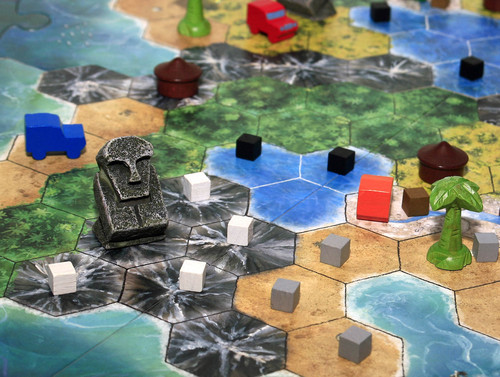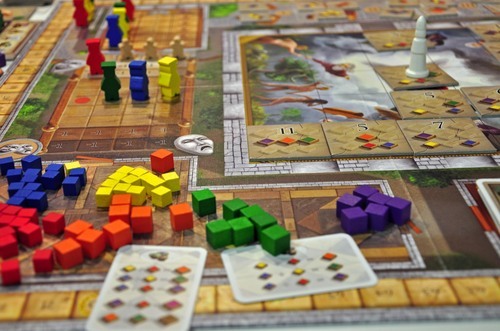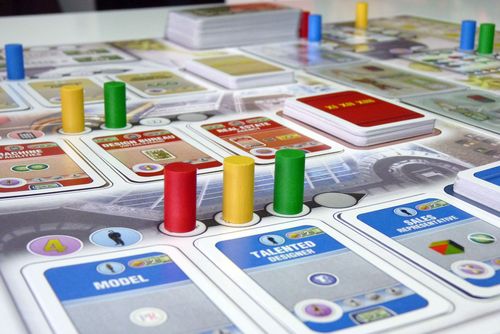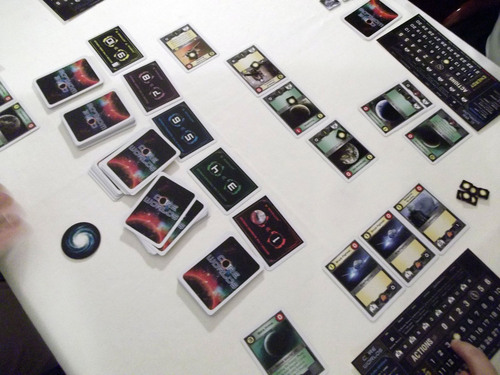A lot of board games come out every year. Some of them are really great. Many of them are okay rehashes of what has come before. Some are crappy. And some are just sort of there. This post is dedicated to the last category.

Tobago came out a couple of years ago and was immediately very popular; it’s a weird puzzle game where players gradually winnow down the number of possible sites where treasure can exist on an island, and then race to get the treasures. It has an interesting set of mechanics and is reasonably interactive (which is key for me, because I hate multiplayer-solitaire games like Agricola – seriously, I could write a thousand words easily on how much I fucking hate Agricola, but that is for another day). But when it is suggested, my response is always “eh.” Tobago doesn’t really feel very competitive to me – in a three- or four-player game, it’s far too easy for a player to scavenge wins based on little more than turn order and a bit of luck. It’s just sort of there. The pieces are cute and I suppose it’s a good gateway game to get people to heavier stuff, but there are plenty of good games to get people to heavier stuff that are better than Tobago – not least because Tobago isn’t really like anything else. That should be a plus in its favour, but it isn’t, because it feels so inessential to me. I mean, when I teach Stone Age – another light game I don’t particularly like – I can at least try to push people to try Caylus eventually, or one of the other half-dozen really good worker placement games out there. But Tobago doesn’t really link to anything.

Fresco is a worker-placement game that can at least lead to better experiences, but I dislike it. It has one clever mechanic – “waking up” your workers earlier means you get initiative for the best slot placements, but it makes your workers less happy which in turn means you gradually get less actions. That’s a clever initiative system and I wish it had been better implemented in this game, where I rarely see worker happiness matter overly – and that’s really my beef with Fresco, which is so very straightforward a game. You get cubes, you turn them into other (more important) cubes, and then you trade in the cubes for points. Too many modern Euro-style boardgames are about trading cubes for other cubes. (In this game, the cubes are supposed to be paint. But really. They’re cubes.) Fresco fails for me, because in attempting to be accessible it fails to really be a game. It’s just a pretty straightforward expanding economy game – get A to get B to get C.

But what’s worst are the ones I really, really want to be good. I was waiting eagerly to play Pret-a-Porter because the theme is so awesome – you’re competing fashion design moguls! Come on, that is a great theme for a boardgame. If I play one more game where I am a merchant in historical Europe I may shoot myself. (Or, more practically, I might shoot other people. I mean, come on. There is only one of me, and so many other people. This is logical, see.) But Pret-a-Porter did not live up to my hopes. It’s a worker-placement game with an economic theme – you’re buying buildings and hiring employees to get more clothing designs and materials so you can present the biggest and best collections at fashion shows.
In practice, the game is a very complex set of steps – buy business resources (A) to assist you in getting designs (B) and raw materials (C) so you can complete sets of clothing (D) which generate you money (E) and victory points (F), the latter being determined by special categories of attributes which you can also earn from the buildings and employees as well as other areas on the board (G) but the victory points also earn you money (back to E) and you need the money to buy the resources and materials in the first place (back to A and C). Furthermore, the game has not one but TWO different ways to borrow money – the “on purpose” way which is reasonably easy and straightforward for a player to play back, and the “emergency loanshark” way which is not. The employees and buildings all do appropriate things (for example, the PR person gives you additional VPs when you come in third or fourth in a category). Really, this game has a ton of clever ideas.
But they don’t work. Because the employees and buildings – which are really the core of the game, as you need them to build your efficiency engine – show up randomly every turn and initiative shifts on a preset order, there is no real way to sacrifice to guarantee to get what you want or need. Which means that the essential parts of the game are essentially doled out to players at random, which would be fine in a lighter game, but this is a game with at least four levels of mental accounting. Which means that you’re brainburning on a game which doesn’t reward you for it. I have no problems with four levels of mental accounting if the game respects the work I’m doing to make it work, but Pret-a-Porter just doesn’t. And that sucks, because I really wanted this to work.

See also: Core Worlds. I’m kind of burned out on Dominion lately, and I’d really like to see a great deckbuilding game take Dominion’s ideas and run with them. None of the wannabes have done so – most have not even come close. Core Worlds was advertised as Dominion with space-empire building, which seemed like a slam dunk. I love Eclipse, but want a quick-and-dirty space game. Something that does what Race For The Galaxy does, except in a deckbuilding context. Core Worlds seemed like that thing! Except, of course, it wasn’t.
See, Core Worlds is another game where turn order is determined by the first player changing every round (the person on your left is first player next round). And you draw replacement cards into the pool randomly from the deck. These cards are either troops and ships, who can earn you the two types of “currencies” in the game (ground-fighting and space-fighting, basically) which let you conquer planets. Simple – except that since the planets are also dealt out randomly, it is quite possible to, for example, have a situation where all of the planets need starfighters, and you never get a starfighter because on your turn to go first there are no starfighters and on other people’s turns they buy the starfighters before you get a chance, so you basically sit there having lost the game in the first couple of turns and that is that. Core Worlds is an example of terrible game design, because when a game can assfuck you on a totally arbitrary basis from the very start of the game, that is a bad idea. Many deckbuilders have also made this same mistake, but their mistake has been to incorporate more complex ideas than the deckbuilding mechanic can handle. Core Worlds is relatively simple and still fucked it up.


Related Articles
25 users responded in this post
I’ve only played Core World twice, but there is the possibility of building up troops/ships so you can kick ass on the next turn. Not sure if that makes up for not have a little extra energy or whatever it’s called at the beginning of the next turn.
My main beef with Core Worlds (which isn’t too bad but definitely feels flawed) is the cards with special powers that need you to have them deployed at specific moments (like the end of the game), which counts on random draw even more; they’re also overpriced given this difficulty of fully using them. But these are the kinds of cards you need to provide variability and interest in play, so it’s too bad they feel a bit unwieldy.
Maybe there’s a way to turn Race into a deck building game… There is the drafting variant, but I don’t think that’s enough…
I love Race as a drafting game because it does what practically no other game does – it has a lot of the tense gameplay of booster-drafting Magic cards (which is far and away the most fun way to play Magic, as it turns it into a cost-effective pair of games) without the expense of booster-drafting Magic because it’s more reusable.
I’d prefer to see a purer drafting game exist than Race (and in fact tinker with one in my spare time) – something more confrontational than 7 Wonders but with the same general idea of gameplay.
If you want a deckbuilding version of Race for the Galaxy, check out Eminent Domain. I ignored it when it was in its Kickstarter phase because the name is boring as hell but it turned out to be my favorite new game of 2011.
It’s got good interaction with following each other’s actions and competing for the fixed tech cards (think of the buildings in Puerto Rico rather than the set of 10 piles from Dominion). Also, while you get some VPs from the high-level cards you can put in your deck, you can do well while ignoring them entirely and the main ways you get points are settling planets or a produce/consume cycle. So there’s another layer of things to do besides just take cards and put them into your deck.
I found Eminent Domain to be very… generic. (Using the same spaceship minis that show up in Galactic Empires and Eclipse didn’t help in that regard.) It’s another interesting set of mechanics that isn’t quite a game.
I agree, I found Eminent Domain very boring. Among other things, I suspect there aren’t many paths to victory, and the game seems to end too quickly (most likely because of the preference for one action).
I hadn’t heard about Pret-a-Porter, so you excited me and disappointed me in one sentence. I would go nuts for a really good game with a fashion design theme.
I’d love to see that Agricola article one day, too. Or maybe an article about board game themes you’d like to see more of?
Speaking of deck building games, I’d like to hear your opinion on Ascension. If you’re not interested to the full investment, it’s very reasonable on the App Store (AI is okay)
I’m not a huge fan of Agricola, and don’t play it as often as many other worker-placements on the shelf. But I think there’s an argument to be made that if you play Agricola just as multi-player solitaire then you’re likely to get beaten by players who don’t play it that way. Resources are frustratingly tight once the feeding rounds come faster and faster — Agricola is as much about denying key resources to your opponents as claiming them for yourself.
I’m enjoying Ninjato. Stone Age with a nasty push-your-luck mechanic, “tools” that actually give you interesting tactical choices, and throwing stars! Kingsburg is also very good.
Tried Ora and Labora yet? Thoughts?
Just out of curiosity, have you played Quarriors? What did you think of it?
MGK, how can you possibly make time for so many interests? TV, comics, board games, movies, blogging… all of that and law school too? Hell, I’m just trying to balance undergrad, work, and law school applications and I feel like I’ve lost complete control of any free time I have.
1.) As I have quoted before: “I’ve learned something about sleep. You don’t need a lot of it.”
2.) I’ve been a practicing lawyer for the better part of a year now. This is more time-intensive than law school, obviously. I just thought I would mention that.
I’m not a fan of it in real life: it’s very light and its randomness precludes anything other than a turn-by-turn strategy. It’s fine as an IOS app, where you can play it in five minutes; that’s about the amount of consideration it merits.
My favorite Dominion-like game is probably Nightfall, which has a nice deck-building mechanic (some cards only you can buy, some cards shared amongst everyone) and interesting interactions between different cards that make chaining them together a worthwhile tactic.
Second what Andrew Ducker said about Nightfall, and what Julian said about Eminent Domain. Nightfall is essentially Magic and Dominion had a baby, and the combos can get mighty interesting.
Also, my favorite way to win Eminent Domain is burn deck style. You go both spaceships and colonizing, and you just keep conquering planets as fast as possible.
And I do want to hear why you hate Agricola.
Your board-game posts always make me upset, because it just makes me wish that 1) My boardgames weren’t all back in Ontario and 2) that I actually had friends with which to play them. Why does no one tell you that being a social recluse will prevent you from experiencing social activities with people?
I enjoy Dominion, but when I played Nightfall I got hooked, and hard. I am looking forward to seeing what the cards the new set introduced do to gameplay.
And Cespinarve, I recommend checking to see if there’s a board game group that meets near you. I stumbled over my local group a couple of years back, and have been there nearly every week since.
“my favorite way to win Eminent Domain is burn deck style”
I believe this is *the* way to win Eminent Domain.
Unsolicited summary of Agricola:
Did I get enough wood in the first few turns?
2) Yes; yay!
1) No, because I got screwed by turn order/other players; f*%$.
Also, speaking of iOS games, everyone get DungeonRaid and waste a million hours on it.
Gotta step in for Core Worlds again. First, as Samy put it, you can absolutely muster strength for a later round: you have each set of planets available for two rounds, with an energy bonus on top of it, meaning you don’t get “assfucked” as you so delicately put it, particularly early on, if you should happen to miss a planet. At least, not any more so than getting gold-screwed in Dominion or any other damned deckbuilder.
Not to mention its come-from-behind energy surge mechanic, which can put you even further into a good position for taking planets later.
Secondly, you don’t just have space and ground: you have the tactics cards like Feint, or more advanced units (once you’ve moved a few sectors in) that can reallocate your ground and fleet strength.
Your complaint reads like you’ve played Core Worlds maybe once or twice? Because I find it about as well-executed as Ascension, which I’ve played to death on my iPad, and which I quite enjoy.
On an unrelated note: if you feel like Agricola’s non-interactive, then I don’t think you’ve played the Gamer deck, or tried it with a drafting variant for minor improvements and occupations. I play it weekly; it’s one of the most cut-throat, interactive games I’ve played, and that includes Risk.
I think you just like hating things, which is fine when you’re as entertaining as you are when ripping into something. I just find your complaints to be out of line with my experience of the games in question. Evidence-based hate is always more persuasive.
Then again, being Wrong on the Internet isn’t a crime. Unless you’re running for office. And when you run for office on an anti-Agricola platform, I’ll be waiting for you outside a dark alley with a whipped-cream pie.
I have never seen a player at a loss for energy. The game has plenty of ways to give you energy – the energy surge mechanic is a nice thought but I found it largely inconsequential in my plays. Actions were far more important to the game’s economy.
Secondly, you don’t just have space and ground: you have the tactics cards like Feint, or more advanced units (once you’ve moved a few sectors in) that can reallocate your ground and fleet strength.
I don’t think the tactics cards make that big of a difference – and in fact one of my major gripes about the game is that your initial tactics cards become completely useless as the game progresses (because they reference infantry and starfighters, and in the later game you’re mostly playing vehicles and capital ships for your “military money”) and there is no way to get rid of them, which is just remarkably stupid design because then all I can do is toss the cards for more energy.
I’ll admit that I’ve played Core Worlds twice (and watched a couple of games prior to that). But witnessing four plays, and seeing the same problems crop up all four times, tells me that the game has issues.
In terms of Ascension – I think as an IOS game it is excellent, because as I said it merits about five minutes’ worth of thought and on IOS you can play it in five minutes, so it’s fun that way. But Ascension and Core Worlds both violate one of the two basic rules for a good deckbuilding game, which Dominion introduced, which is “players should have reasonably equal access to resources.” The turn-based “variety deck” design makes this impossible – I have simply lost count of the number of times I have won a game of Ascension simply because I got a Void Initiate or other deck-slimming card on my first turn (which is a huge advantange). Core Worlds is even worse than Ascension is because the card pool is much smaller and there’s little duplication of resources within the deck.
And Core Worlds then violates the OTHER rule, which is “provide a way for players to upgrade their deck at all times with basic “advanced” cards.” Even Ascension doesn’t do that: I can always buy Mystics or Heavy Infantry (or kill a Cultist) if need be, so resources are never really wasted. Whereas in Core Worlds I found this frequently to be the case.
Race for the Galaxy was kinda amusing as a fifteen minute distraction, but winning or losing in it was massively dependent on simply whether you drew good cards or not.
Dominion I absolutely hated. It’s like playing Magic the Gathering with only twelve cards. I have no idea how people can like it when it has the tactical depth of a paper plate.
Agricola on the other hand is fantastic. I love how it manages to operate completely differently in each game I have have played, never repeating itself, without depending on the expansion treadmill to keep itself alive. Fifty games later, we haven’t even exhausted the possibilities of the basic box.
Even after all the deckbuilding games I’ve played (most of them), Dominion is still probably the best. (I haven’t talked anyone into trying the Race draft variant, though.)
I hate to say that, because its the one which stays closest to the pure euro style of getting resources to get more resources to get points which are themselves just dead weight. But like the others said, all the competitors either have some kind of randomized display of what cards are available (Ascension, Eminent Domain, Thunderstone), or a runaway leader problem (Core Worlds, Quarriors), or both.
Nightfall, as mentioned, does not have these issues. It just has the more serious problem of embodying all the worst aspects of a multiplayer magic game, topped off with a really overused theme.
At this stage, I’m going to be That Guy, and point out that while all of these games aren’t bad, at some point you’re going to have to admit to yourself that what you really want to play is a CCG. (Ignore this if what you really want to play is Diplomacy, 18C2C, Ora et Labora, TI3, or ASL.) If so, and if you want that low-cost option MGK alluded to in his first reply, you and your friends should really look into making a drafting cube (a semi-fixed reusable set for making decks out of). It can be adapted to whatever game, playstyle, and draft variant you like, and put together with some planning but little expense. I made one and have been very pleased with it.
Hijacking: I love board games. Every time MGK does a post like this I get super-excited and want to play ALL THE GAMES. That being said, I have played very few. I own only Pandemic, Carcassonne, and Catan. I would love to see an article about good “entry-level” games that would preferably not bankrupt me and could flesh out my whole experience. Boardgamegeek is pretty overwhelming as a resource to finding new games. I see games that seem cool but there’s always a nagging, “This game could suck and be $50 down the drain.” Any ideas?
Nathan: try Modern Art; there’s a card game version, but the original has auctions, both good but the auction one is the full experience. Usually around $20.
Dominion is still the best deck building game in my mind, although you need to get the expansions and ban certain cards. Nothing newer has come close to it. Draft Magic, while excellent as options go, has this ever-greater-oscillating-to-craziness aspect (at least with the Planeswalker stuff) that, while fun, makes it score below Dominion for me. Amazingly well put together though, and hard to beat for variety.